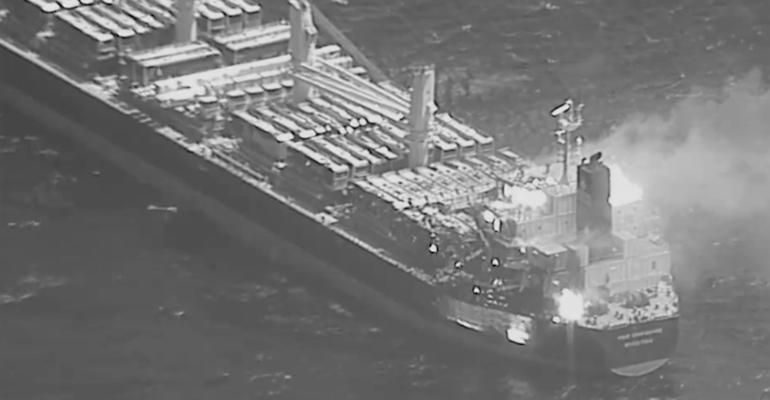The first deaths and serious injuries among merchant seafarers from Houthi missile attacks have been recorded, something that seems quite inevitable as the armed gangs improve their techniques. The crew of the Galaxy Leader remain hostages in rebel-held Yemen, more than five months after they were captured.
Attacks by drone, missile and remote-controlled craft continue to be inflicted on those ships which brave the waters of the lower Red Sea and Gulf of Aden, despite the US and UK air strikes on the perpetrators and brisk defence by warships.
And as if this was not misery enough for mariners on their lawful business, ships have been attacked and captured off the Somali coast in what seems to be a resumption of offshore piracy and hostage taking. The revenues from the Suez Canal, upon which so much of the fortunes of Egypt rest, are being rapidly eroded.
Just a few months ago, to compose such words as those above would have suggested that the writer was out of his mind, such has been the speed of this deterioration in world affairs. But it now seems clear that this will be no short-term breakdown in normal commercial operations, but a long-haul for east-west shipping, regardless of whether owners elect to hazard the lives of their crews, or go the long way around Africa.
The Red Sea is going to remain dangerous and the safety of merchant shipping is going to depend increasingly upon the political willingness of those with naval assets available, to protect them.
It also seems obvious that there are insufficient escorts of the right capability to ensure that passing merchant ships will not be attacked, regardless of their flag or alleged ownership.
It might seem a relatively small area on a world map, but these are long coastlines and a lot of water for warships to patrol. And despite the Houthis’ successes, and the voices of outrage from shipping and governmental interests, only the US and UK have been prepared to act in anything other than a defensive role and take the fight to those launching the drones and missiles. Considering that these rebels managed to maintain their fierce resistance for several years against everything the Saudi Arabian armed forced could throw at them, success at permanently degrading their abilities to interfere with shipping is certainly not guaranteed.
How long will the loose coalition that isn’t for armed protection be maintained, bearing in mind the costs of firing hugely expensive missiles against cheap mass-produced drones and keeping ships on station in a permanent state of readiness? The patience of taxpayers cannot be entirely guaranteed in many of the countries supplying warships, particularly when domestic pressures become acute in election years, or when finances for defences are squeezed.
It is not unreasonable for the shipping industry to emphasise that these are their ships, feeding and fuelling the world, which are being attacked and deserve the protection of right-thinking nations with naval assets available. But with the curious structure of the modern merchant fleet, there is a disconnect between the people expected to pay the bills for warships and the ownership, flag flown, the nationality of the seafarers involved and the invariably convoluted financial ownership of the ships themselves. To most people other than in the manpower-supplying nations, there is no getting away from the fact that these are “foreign” ships, for which they can feel no real affinity.
It was so much simpler, we might reflect, before the flags of convenience became so firmly established upon the world’s oceans. But there should be no concern about the ability of the world fleet to deliver the goods; the Suez Canal has been closed twice before, for extended periods. And in the absence of peace suddenly breaking out, a longer, and more expensive haul, may well become the norm.
Copyright © 2024. All rights reserved. Seatrade, a trading name of Informa Markets (UK) Limited.
Add Seatrade Maritime News to your Google News feed.  |

